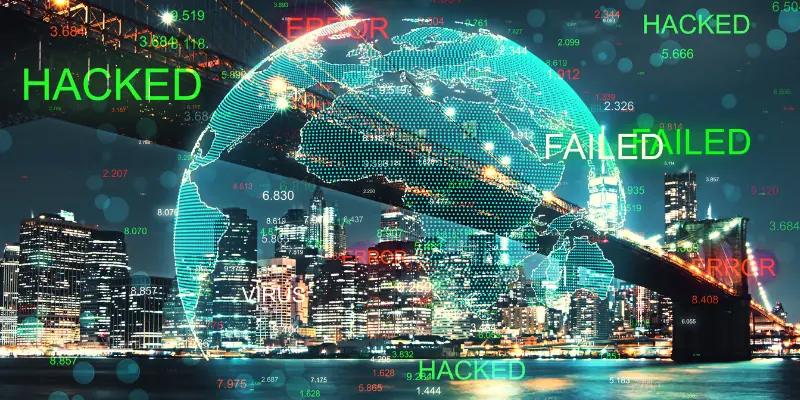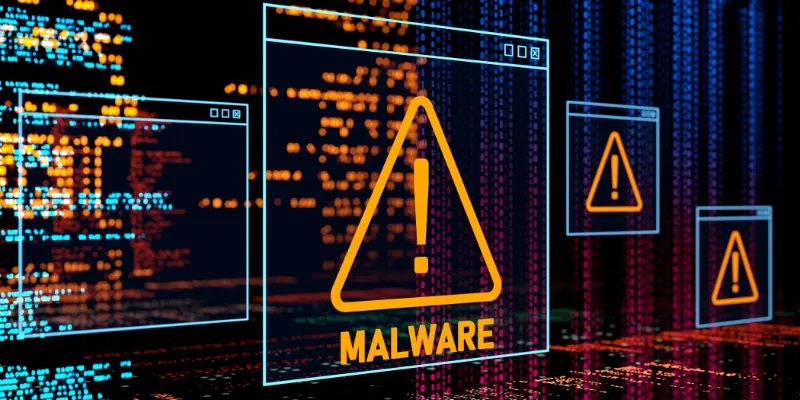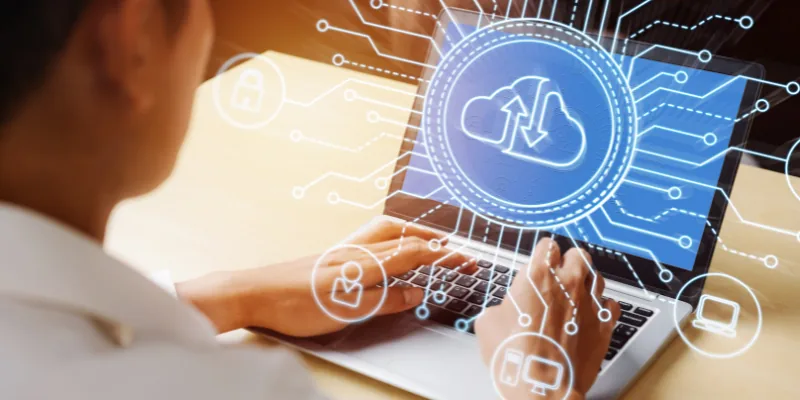Disadvantages of Computer in Cybersecurity for Data Risks
Published: 22 Feb 2025
Imagine a high-tech security system designed to protect a bank. It has cameras, alarms, and digital locks. But what if a hacker finds a way to disable the system remotely? Instead of guarding the bank, the very technology meant for security becomes its biggest weakness.
Computers work the same way in cybersecurity. They help protect data, detect threats, and secure online transactions. But at the same time, they are also vulnerable to hacking, viruses, and cyberattacks. The more we rely on them, the more we expose ourselves to digital risks. In this blog, we’ll explore the disadvantages of computer in cybersecurity and how to reduce their risks.
Hacking and Data Breaches:
Computers are vulnerable to hackers, who can find ways to access private information. When hackers breach a system, they can steal sensitive data, such as passwords, credit card details, or personal records. These attacks can happen in many ways, such as phishing or exploiting software flaws. Even with strong passwords or encryption, there is still a chance of being targeted.
- Hackers try to break into systems to steal data.
- Personal information is often the target.
- Breaches can happen through different methods, like phishing.
- Even the best security measures can be broken.
- Hackers are always coming up with new ways to attack.
- Once data is stolen, it can be sold or used maliciously.
- Systems may not notice the breach right away.
- It can take a long time to fix the damage caused by a breach.
- Hackers can target both businesses and individuals.
- Protecting against hackers requires constant vigilance.

Malware and Viruses:
Malware and viruses are harmful programs that can damage computers. These threats can come from unsafe websites, emails, or downloads. Once they get into a system, they can cause major problems like deleting files or stealing data. Keeping computers safe requires antivirus software and regular updates to detect and remove these threats.
- Malware and viruses harm computers and steal data.
- They can spread through emails or downloading files.
- Antivirus software can help block these threats.
- Some viruses can hide and be hard to detect.
- Malware can slow down your computer or make it crash.
- Viruses can target personal files and important data.
- They can also spread across networks and affect many devices.
- Even trusted websites can unknowingly spread viruses.
- Regular updates are necessary to protect against new viruses.
- Malware attacks can be costly and damaging.

Managing Security Systems:
Managing a cybersecurity system can be very complicated. There are many layers of protection, like firewalls, encryption, and intrusion detection, which need constant attention. If any part of the system is not updated or monitored, it can leave a security gap. Managing these systems requires skilled professionals who understand how everything works together.
- Cybersecurity systems have many layers to manage.
- Each part needs regular updates and checks.
- Without expertise, it’s easy to make mistakes.
- Security flaws can lead to system vulnerabilities.
- Skilled professionals are needed to manage the system.
- Small errors in the system can create big risks.
- Complex systems can be overwhelming for small businesses.
- Training staff is important for keeping systems secure.
- Security tools may require constant monitoring.
- It’s hard to stay ahead of fast-evolving threats.
Cost of Security Tools:
Advanced cybersecurity tools are expensive, especially for smaller organizations or individuals. To protect against threats, businesses often need firewalls, encryption software, and more. These tools add up quickly, making it hard for some to afford top-level protection. Without the right tools, systems may be left vulnerable to attacks.
- Advanced tools like firewalls and encryption are costly.
- Small businesses often struggle to afford them.
- Protection can become a big financial burden.
- Cheap security tools may not be effective enough.
- Investment in security is necessary to prevent big losses.
- Premium tools provide better protection but are not always affordable.
- For individuals, buying security software can be expensive.
- The cost of breaches can be even higher than security tools.
- Businesses need a budget for ongoing security maintenance.
- Cutting costs on security can lead to serious risks.
Over-reliance on Automation:
Automated security systems can help detect threats, but they have limitations. They can sometimes miss new or advanced types of attacks. While automation is helpful, it cannot fully replace human judgment. Relying too much on automated systems can lead to missing complex threats or making wrong decisions.
- Automated systems detect threats without human input.
- They can miss new or unknown threats.
- Some cyberattacks are too complex for automation to understand.
- Automation lacks the ability to make judgment calls.
- Human intervention is often necessary to spot hidden threats.
- Over-reliance on automation can lead to false security.
- Automation might fail in case of a sophisticated attack.
- Security systems should balance automation and human oversight.
- Automated tools need regular updates to stay effective.
- It’s important to check automated alerts and responses.
Lack of Human Oversight:
Automated cybersecurity systems often work without much human involvement. However, computers cannot think or reason like people. When something unexpected happens, human oversight is needed to make decisions. A lack of human judgment can lead to gaps in security and missed threats.
- Automated systems work without human oversight.
- Computers cannot think critically or adapt to new situations.
- Complex attacks require human decision-making.
- Security systems may fail to detect new attack types.
- Humans can spot patterns that computers might miss.
- The combination of humans and automation is most effective.
- Relying only on computers for security can be risky.
- It’s important to have trained people watching over systems.
- Errors in judgment can lead to poor security choices.
- Human involvement helps catch issues before they escalate.
Insider Threats:
Insider threats come from people within an organization, like employees or contractors. These individuals may intentionally or accidentally cause harm to the system. They could leak sensitive data or misuse access. Insider threats are hard to detect, making them dangerous to security.
- Insider threats come from people within the organization.
- Employees can steal data or cause damage intentionally.
- Accidental actions, like sending the wrong email, can also harm systems.
- These threats are often harder to spot than external attacks.
- Insider threats can lead to serious data breaches.
- Trusted individuals may misuse their access for personal gain.
- Employees may not always be aware of their actions.
- Detecting insider threats requires careful monitoring.
- Strong internal policies can help reduce these risks.
- Regular staff training helps prevent accidental threats.

Data Storage and Privacy:
Storing large amounts of data on computers brings risks. Sensitive information like personal details, bank accounts, or passwords can be exposed. If this data is not securely stored, it could be hacked or leaked. Using encryption and secure storage methods is crucial to protect data.
- Storing sensitive information can lead to privacy risks.
- Hackers may target stored data for theft.
- Data leaks can expose personal or business information.
- Encryption helps protect data from unauthorized access.
- Secure storage practices are necessary to keep data safe.
- Personal data needs extra protection due to privacy laws.
- Storing data on the cloud can have its own risks.
- Companies must follow strict rules to protect customer data.
- Employees should have limited access to sensitive information.
- Regular audits can ensure data security.

Securing Endpoints:
With many devices connected to networks, securing each one is a challenge. Laptops, smartphones, tablets, and other devices are all potential entry points for cyberattacks. It’s hard to protect every device from threats, especially when users may not follow security protocols. Each connected device needs careful monitoring and updates.
- Every device connected to a network is a potential threat.
- Smartphones and laptops can be targets for hackers.
- Users might not follow security rules on their devices.
- Securing each device takes time and effort.
- Endpoint protection is crucial for overall security.
- Mobile devices are often less secure than computers.
- Devices need regular updates to stay protected.
- Employees might use personal devices for work, increasing risks.
- Hackers can exploit vulnerabilities in any connected device.
- Comprehensive security plans must include all endpoints.
Evolving Cyber Threats:
Cybersecurity threats change rapidly. Hackers constantly develop new ways to break into systems, making it hard to keep up. Even the best security measures may become outdated quickly. Defenders need to stay ahead of these fast-moving threats to protect their systems effectively.
- Cyber threats evolve faster than defenses can keep up.
- Hackers constantly develop new attack methods.
- Security tools need regular updates to fight new threats.
- Outdated security systems are vulnerable to new attacks.
- It’s hard to predict the next type of cyberattack.
- Defenders need to be proactive to stay ahead.
- Fast changes in threats can lead to security gaps.
- Experts must constantly research and monitor new threats.
- The speed of new attacks challenges cybersecurity professionals.
- Staying ahead requires constant improvement of defenses.
Cybersecurity is the practice of protecting computer systems and data from cyberattacks. It’s important because it helps keep your personal information safe from hackers, viruses, and other digital threats. Without cybersecurity, your data could be stolen or damaged.
Computers become vulnerable when they are not protected by strong passwords, security updates, or antivirus software. Hackers can use these weaknesses to access sensitive information or cause harm. Regular updates and secure passwords can help prevent these attacks.
Malware is malicious software designed to harm your computer, steal information, or damage your files. It can sneak into your system through emails, downloads, or websites. Keeping antivirus software up to date can help protect your computer from malware.
Phishing is when cybercriminals trick you into giving away personal information by pretending to be a trusted source, like your bank or an online store. To avoid phishing, never click on suspicious links or share your info through unverified emails. Always check the sender’s details before responding.
Outdated software may have security holes that hackers can exploit to access your computer. When software updates are available, they often include fixes for these vulnerabilities. Regularly updating your software helps keep your computer secure.
A strong password is at least 12 characters long, includes a mix of letters, numbers, and symbols, and avoids common words. Avoid using personal information like your name or birthdate. Consider using a password manager to store and generate secure passwords.
Two-factor authentication (2FA) adds an extra layer of security by requiring you to verify your identity in two ways, like entering a code sent to your phone. It’s a good idea to use 2FA for accounts with sensitive information, like email or banking. It makes it harder for hackers to access your account.
Free antivirus software can help protect against basic threats but may not offer complete protection. It often lacks advanced features like real-time scanning or customer support. Investing in a paid antivirus program can provide stronger and more comprehensive protection.
Signs that your computer may have been hacked include slow performance, strange pop-ups, missing files, or unfamiliar programs. If you suspect a hack, run a full antivirus scan and change your passwords immediately. It’s also important to monitor your bank statements for any unusual activity.
If your computer is infected, disconnect it from the internet to prevent further damage. Run an antivirus scan to remove the virus and restore your system from a recent backup. If the virus persists, seek help from a professional technician.
Conclusion:
In summary, while computers play a critical role in cybersecurity, they also come with significant risks like hacking, viruses, and over-reliance on outdated systems. These disadvantages can leave us vulnerable to serious threats if we aren’t careful. One common mistake people make is ignoring software updates or relying on weak passwords. Failing to take basic precautions, such as updating your systems regularly or using two-factor authentication, can make your computer an easy target for hackers. To stay safe, it’s important to stay alert and prioritize security.

- Be Respectful
- Stay Relevant
- Stay Positive
- True Feedback
- Encourage Discussion
- Avoid Spamming
- No Fake News
- Don't Copy-Paste
- No Personal Attacks

- Be Respectful
- Stay Relevant
- Stay Positive
- True Feedback
- Encourage Discussion
- Avoid Spamming
- No Fake News
- Don't Copy-Paste
- No Personal Attacks
